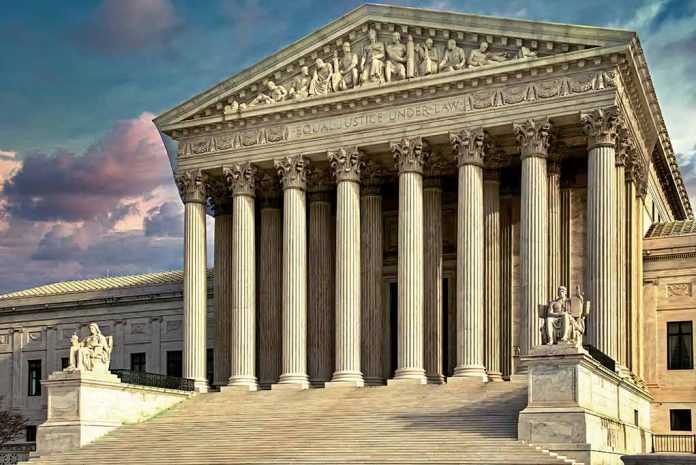
South Carolina’s Supreme Court blocks public funds for private school tuition, sparking controversy over educational freedom.
At a Glance
- South Carolina’s highest court ruled 3-2 that using taxpayer money for private school tuition violates the state constitution
- The ruling affects up to 5,000 families who could have received $6,000 scholarships for private education costs
- Nearly 3,000 students have already received $1,500 each under the program and are not required to repay it
- The decision allows the use of funds for indirect private expenses like tutoring and textbooks
Court Ruling Blocks Private School Funding
In a significant decision, the South Carolina Supreme Court has ruled that the state’s law allowing parents to use taxpayer money for private school tuition violates the state constitution. The 3-2 ruling has effectively halted a program that would have provided up to $6,000 in vouchers for up to 5,000 students annually, with plans to expand to 15,000 students in the future.
The court’s decision focuses on a state constitutional clause that prohibits public funds from directly benefiting religious or private educational institutions. Justice Gary Hill, in his first major opinion since joining the court, emphasized the historical context of the 1972 constitutional amendment ensuring free public education for all children.
Another state constitution blocks charter schools – Virginia’s Con limits spending authority to school boards and few are willing to lose public dollars to private entities. #valeg https://t.co/KKf6ArYZ5j pic.twitter.com/OtSZzVx70v
— BK (@BradKutner) September 11, 2024
Impact on Families and Education Landscape
The ruling has immediate consequences for families who had already begun using the program. Nearly 3,000 students have received $1,500 each under the initiative, and they will not be required to repay these funds if used for private school tuition or fees. However, the decision disrupts the school year for students who had already used the vouchers and affects future plans for families counting on this financial support.
“A parent who chooses to use a scholarship to pay their child’s private school tuition is undoubtedly using public funds to provide a direct benefit to the private school,” wrote Justice Gary Hill in his first major opinion since joining the court a year ago.
While the ruling prohibits using “Education Scholarship Trust Funds” for private school tuition or fees, it does allow their use for indirect private expenses such as tutoring and textbooks. This partial allowance may provide some relief to families seeking additional educational support outside of public schools.
The Supreme Court of the State of South Carolina has ruled that Education Scholarship Trust Fund program violates the state's constitution when it uses public money to fund private school education.
https://t.co/rRtS75TdRf— WCNC Charlotte (@wcnc) September 11, 2024
Political Reactions and Future Implications
The decision has sparked strong reactions from state leaders and education advocates. Republican State Superintendent of Education Ellen Weaver and Governor Henry McMaster expressed disappointment and concern over the ruling’s impact on low-income families. Supporters of the law may consider appealing or attempting to amend the constitution, though achieving a majority vote could prove challenging.
“Our General Assembly knew how to draft an amendment to present to the people that would allow public funding for private schools, but it did not,” Hill wrote of lawmakers more than 50 years ago.
Chief Justice John Kittredge dissented, arguing that the ruling undermines the Legislature’s broad policy-making powers. He compared the program to other state-funded educational initiatives like college scholarships and pre-kindergarten programs, highlighting potential inconsistencies in public funding for education across different levels.
Broader Context and National Trends
The South Carolina law is part of a broader national movement, with at least 16 states having similar voucher programs. This ruling follows a similar decision by Kentucky’s Supreme Court, which also struck down a state voucher program. As states grapple with the balance between public funding and private education options, these legal challenges highlight the ongoing debate over school choice and educational funding allocation.
“The literary style of the majority opinion may be appealing, but its underlying rationale is anathema to the rule of law,” Kittredge wrote.
As the dust settles on this landmark decision, South Carolina lawmakers and education advocates are left to consider their next steps. Whether through constitutional amendments, alternative funding structures, or new legislative approaches, the push for educational choice in South Carolina is likely to continue, reflecting the ongoing national conversation about the future of education funding and access.
Sources:
- Court won’t allow public money to be spent on private schools in South Carolina
- SC Supreme Court blocks public funding of private schools, disappointing state leaders
- Court Strikes Down South Carolina School Voucher Program
- SC Supreme Court blocks public funding of private schools, disappointing state leaders
- South Carolina Supreme Court ruling strikes down state-funded vouchers to private schools
- SC Supreme Court finds program that uses public funds for private school violates constitution









